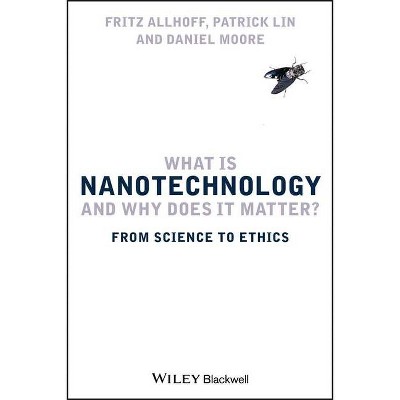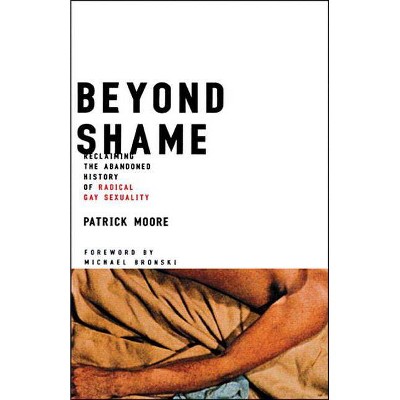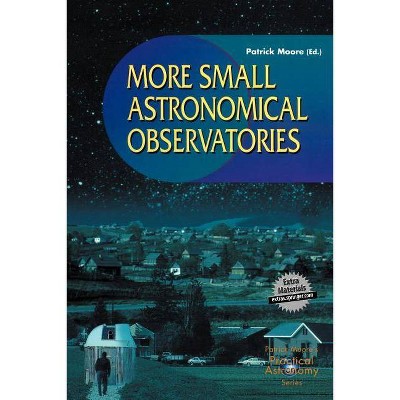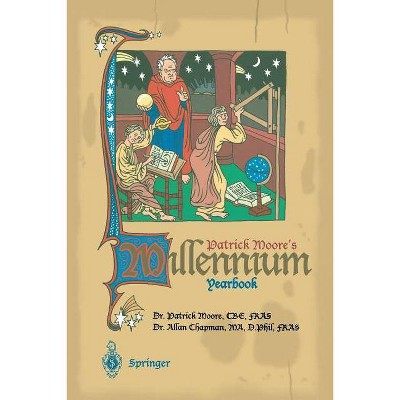What Is Nanotechnology - by Patrick Lin & Daniel Moore & Fritz Allhoff (Paperback)

Similar Products
Products of same category from the store
AllProduct info
<p/><br></br><p><b> Book Synopsis </b></p></br></br>Ongoing research in nanotechnology promises both innovations and risks, potentially and profoundly changing the world. This book helps to promote a balanced understanding of this important emerging technology, offering an informed and impartial look at the technology, its science, and its social impact and ethics. <ul> <li>Nanotechnology is crucial for the next generation of industries, financial markets, research labs, and our everyday lives; this book provides an informed and balanced look at nanotechnology and its social impact</li> <li>Offers a comprehensive background discussion on nanotechnology itself, including its history, its science, and its tools, creating a clear understanding of the technology needed to evaluate ethics and social issues</li> <li>Authored by a nanoscientist and philosophers, offers an accurate and accessible look at the science while providing an ideal text for ethics and philosophy courses</li> <li>Explores the most immediate and urgent areas of social impact of nanotechnology</li> </ul><p/><br></br><p><b> From the Back Cover </b></p></br></br><p><b>"The authors<i> of What Is Nanotechnology and Why Does It Matt</i>er? answer their question with a broad and balanced examination of the nature of nanotechnology, how it is unfolding, and how these developments will affect issues of global concern: the impact of emerging technologies on the environment, medicine, military affairs, and civil society, and how we can act to achieve better outcomes."</b></br> Eric Drexler, author of <i>Nanosystems: Molecular Machinery, Manufacturing, and Computation</i> <p><i><b>"What Is Nanotechnology and Why Does It Matt</i>er? provides a concise but clear introduction to the subject of nanotechnology as well as an excellent overview of nanotechnology's ethical and social implications. I highly recommend it."</b></br> James Moor, Dartmouth College <p>Nanotechnology is an immensely complex area poised to impact virtually all areas of life, ushering in the next technological revolution. <p><i>What Is Nanotechnology and Why Does It Matter?</i> provides a balanced understanding of this important emerging technology and the social and ethical issues that come from it. Divided into three sections, the book starts with a substantial introduction to the science of nanotechnology, then attends to basic issues and principles such as risk and regulations needed to evaluate nanotechnology's impact, with the final section closely examining some of the most important areas of application, such as environmental, privacy, military, medical and enhancement, as well as their ethical and social implications. <p>Designed for students in ethics and technology, <i>What Is Nanotechnology and Why Does It Matter?</i> is also an invaluable resource for policymakers, scientists, and industry executives.<p/><br></br><p><b> Review Quotes </b></p></br></br><br><p>"This book deserves to be read by anyone interested in why nanotechnology is important and why it matters, and particularly by anyone new to this field. For those already familiar with some (if not all) of the topics that the book covers, there is still some benefit to be gained from reading about some of the latest applications in areas in which they may not have such detailed knowledge. It also permits the reader to take a critical stance on the topics and arguments raised in the book, especially since the book's objective is to prompt the dialogue that is needed to achieve further progress and to continue to broaden the debates." (<i>Nanoethics</i>, 1 October 2014)"</p> <p>"However, for the reader looking for general background about nanotechnology and many of its social and ethical issues, the book is worth reading, as long as its arguments are carefully scrutinized and increased understanding of connections among such issues is not expected." (<i>Bioethical Inquiry</i>, 2011)</p> <p>"I highly recommend this book. It is certain that nanotechnology's advance will continue, affecting many facets of our lives. Fritz Allhof, Patrick Lin, and Daniel Moore have provided the best available overview of the many changes that one can expect to see as a result of nanotechnology's continued advances, and the many ethical implications inherent in this advance. While the authors ask many more questions than they answer, they prepare the intellectual landscape for the ethical debates that are certain to take place over the coming years regarding the often-insidious infusion of various manifestations of nanotechnology into our society." (<i>Journal of Military Ethics</i>, 19 April 2012)</p> <p>In their recent publication, What is Nanotechnology and Why Does it Matter: From Science to Ethics, the authors Fritz Allhoff, Patrick Lin, and Daniel Moore search for answers to these two questions-questions which, whether directly addressed or not, underlie all scholarly, political, and consumer protection writings on nanotechnology. In this 260 page, thirteen-chapter book, the authors come impressively close to providing satisfying answers to these questions. (Amber Hottes, Nanotechnology Law & Business, Volume 7, Issue 2)</p> <p>As with a number of other such books in print, What is Nanotechnology and why does it Matter? brings both scientific knowledge and Ethical/Legal/Societal implications (ELSI) to bear. It heralds the profound changes of nanotechnology while attempting to provide an effective way to deliberate ELSI, as nanotechnology unfolds into full development. In seeking to tame a riot of speculation [ix], Allhoff, Lin, and Moore reveal much of the complexity of the ongoing discourse on this matter, leaving quandary on multiple related issues. The tripartite layout of the book demarcates particular areas of expertise represented by the individual authors, in an unusual collaboration that brings distinctive breadth to a relatively well-published area of inquiry. (Rosalyn W. Berne, The Journal of Philosophy, Science & Law, Volume 11, 10 October 2011)</p> <p>The book is well-suited to be used either as a coherent text for introductory courses focused specifically on nanotechnology, or used as stand-alone chapters that can be selected to augment and supplement readings in a wide range of courses in fields such as public policy, engineering, sociology, or philosophy of science. The highly interdisciplinary perspective offered in this book should also serve as a model of how scholars can effectively collaborate across fields in ways that break down obstacles and connect findings across disciplines that are all-too-often isolated. (Evan S. Michelson, Science and Public Policy, 2011)</p> <p>Overall What is Nanotechnology and Why does it Matter? From Science to Ethics makes an important contribution to the literature as it offers an overview of the nature and implications of nanotechnology. Scientists, researchers, students, industry executives and policymakers will find this volume extremely informative and useful. As advancements in nanotechnology will take place, further dialogues and debates are needed to move nano-products responsibly into the market. (Fabrice Jotterand, International Journal of Applied Philosophy,2010)</p> <p>Undoubtedly, reading this book will stimulate a great deal of discussion, which is, perhaps, its chief merit. From this viewpoint the great breadth of coverage is a definite advantage, because it ensures that there is a great variety of food for thought in the content. (Nanotechnology Perceptions, 1 November 2010)</p> <p>This book was very carefully constructed. Painstaking internal cross-reference refer the reader to fuller discussions of topics in other chapters. Nearly every chapter, at the start and conclusion, includes a few sentences on scope. (<i>Nanotechnology Law & Business</i>, summer 2010)</p><br><p/><br></br><p><b> About the Author </b></p></br></br><p><b>Fritz Allhoff</b> is Professor in the Department of Philosophy at Western Michigan University. <p><b>Patrick Lin</b> is Professor at California Polytechnic State University, San Luis Obispo, where he is also the director of the Ethics + Emerging Technologies Group. He is also an affiliate scholar at the Stanford Law School, Center for Internet and Society. <p><b>Daniel Moore</b> is a research scientist on nanoscale semiconductor solutions for IBM and has served on the Georgia Institute of Technology's honor committee.
Price History
Cheapest price in the interval: 54.99 on October 28, 2021
Most expensive price in the interval: 54.99 on December 9, 2021
Price Archive shows prices from various stores, lets you see history and find the cheapest. There is no actual sale on the website. For all support, inquiry and suggestion messagescommunication@pricearchive.us




















